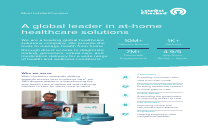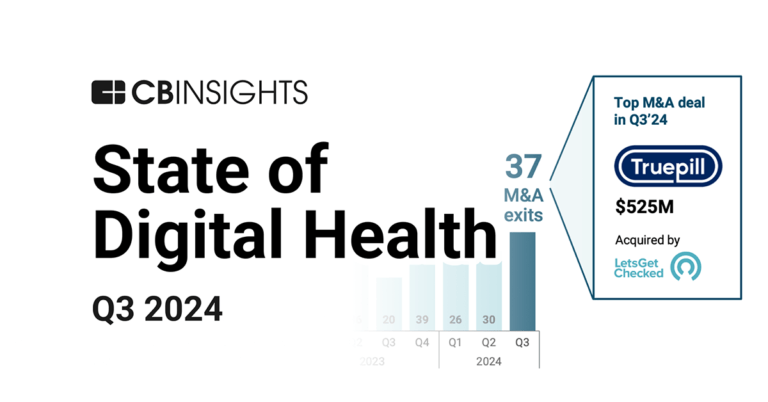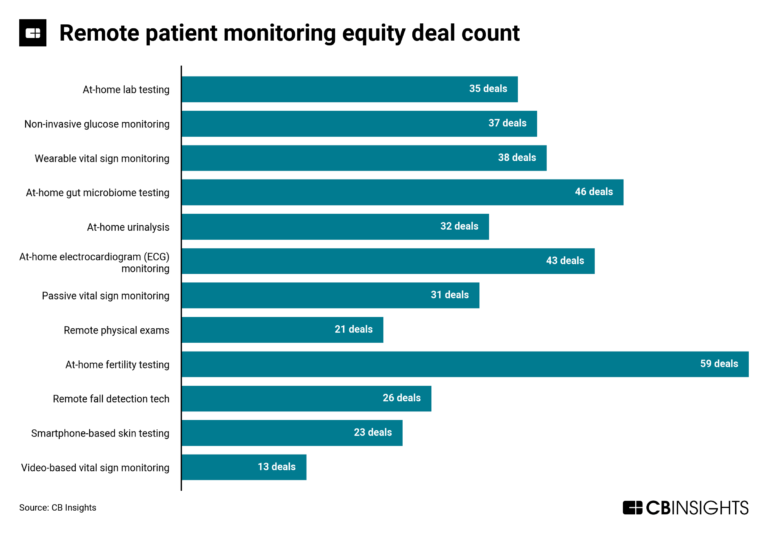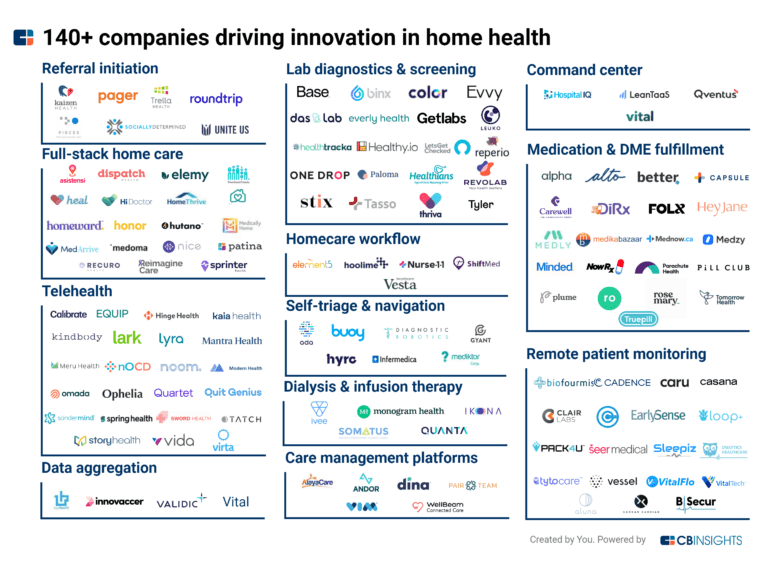
LetsGetChecked
Founded Year
2015Stage
Series F | AliveTotal Raised
$448MLast Raised
$165M | 2 mos agoMosaic Score The Mosaic Score is an algorithm that measures the overall financial health and market potential of private companies.
+54 points in the past 30 days
About LetsGetChecked
LetsGetChecked is a virtual care company that provides at-home health testing and telehealth services. The company offers a variety of health tests with online results, virtual consultations, and prescription medication delivery. LetsGetChecked serves individuals seeking healthcare solutions and organizations looking for employee wellness programs. It was founded in 2015 and is based in New York, New York.
Loading...
LetsGetChecked's Product Videos

ESPs containing LetsGetChecked
The ESP matrix leverages data and analyst insight to identify and rank leading companies in a given technology landscape.
The at-home diagnostic testing platforms market includes companies that provide consumer-friendly testing solutions enabling individuals to collect and analyze biological samples in their own homes. Core solutions encompass a range of testing modalities including blood, urine, saliva, and DNA analysis, supported by digital platforms that deliver lab-certified results, personalized health insights,…
LetsGetChecked named as Leader among 13 other companies, including Quest Diagnostics, Function Health, and Healthy.io.
LetsGetChecked's Products & Differentiators
Home lab testing
Providing easy-to-understand and actionable health insights for over1200 biomarkers from the comfort of home. Powered by our high-complexity labs around the world.
Loading...
Research containing LetsGetChecked
Get data-driven expert analysis from the CB Insights Intelligence Unit.
CB Insights Intelligence Analysts have mentioned LetsGetChecked in 4 CB Insights research briefs, most recently on Oct 17, 2024.

Oct 17, 2024 report
State of Digital Health Q3’24 Report
Aug 15, 2023
The remote patient monitoring market mapExpert Collections containing LetsGetChecked
Expert Collections are analyst-curated lists that highlight the companies you need to know in the most important technology spaces.
LetsGetChecked is included in 5 Expert Collections, including Unicorns- Billion Dollar Startups.
Unicorns- Billion Dollar Startups
1,261 items
Digital Health 50
450 items
The most promising digital health startups transforming the healthcare industry
Digital Health
11,313 items
The digital health collection includes vendors developing software, platforms, sensor & robotic hardware, health data infrastructure, and tech-enabled services in healthcare. The list excludes pureplay pharma/biopharma, sequencing instruments, gene editing, and assistive tech.
Telehealth
3,114 items
Companies developing, offering, or using electronic and telecommunication technologies to facilitate the delivery of health & wellness services from a distance. *Columns updated as regularly as possible; priority given to companies with the most and/or most recent funding.
Women's Health Tech
694 items
This collection includes companies applying technology to address a spectrum of physical, mental, and social well-being concerns specific to women. Examples include companies in reproductive health, maternal care, fertility tracking, and menopause support.
Latest LetsGetChecked News
Jan 17, 2025
China: Projected to grow at a strong 4.8% CAGR (2025–2035). This growth underscores increasing consumer demand for convenient, reliable, and accessible at-home diagnostic solutions globally. "At-home testing offers unparalleled convenience and empowers individuals to take proactive steps in managing their health, Advancements in diagnostic technology have significantly enhanced the accuracy and reliability of these tests, making them an integral part of the global healthcare landscape. As consumer awareness and confidence in self-diagnostic tools increase, we expect sustained market growth," says Sabyasachi Ghosh Associate Vice President at Future Market Insights (FMI) analyst. https://www.futuremarketinsights.com/reports/at-home-testing-market Competitive Landscape: The at-home testing market remains fiercely competitive, with established leaders and emerging players striving to gain market share. Key industry leaders focus on delivering innovative solutions by partnering with prominent players, leveraging advanced technologies and user-friendly designs. Many competitors integrate smart technology into their offerings, enabling seamless connectivity with mobile apps and cloud-based platforms for real-time data tracking and monitoring. Recent Industry Developments in the At-Home Testing Market: In October 2024, LetsGetChecked, a global leader in healthcare solutions, announced the acquisition of Truepill, a prominent digital pharmacy platform. This strategic move enhances LetsGetChecked's capabilities to support healthcare partners—including employers, health plans, providers, and life sciences—in delivering high-quality care and improving health outcomes for diverse populations. Key Players of At-Home Testing Industry: Abbott Laboratories By Product Type: In terms of service, the industry is divided into digital monitoring instruments, cassettes, midstream, strips, cups, dip cards, test panels, sample collection kits and others. By Application: In terms of application, the industry is divided into blood glucose testing, pregnancy & fertility testing, cancer testing, STD/ STI testing (chlamydia and gonorrhoea, HIV testing) testosterone, drug abuse testing, cholesterol testing, thyroid testing and others. By Sample: In terms of sample, the industry is divided into urine, blood, saliva, stool, vaginal swab, and semen. By Distribution Channel: In terms of distribution channel, the industry is segregated into drug stores, hospital pharmacies and online channels By Region: Key countries of North America, Latin America, East Asia, South Asia & Pacific, Western Europe, Eastern Europe, and Middle East and Africa (MEA) have been covered in the report. French Translation – Le marché mondial des tests à domicile est sur le point de connaître une croissance remarquable, avec des ventes qui devraient passer de 7 789,1 millions USD en 2025 à 11 877,8 millions USD d'ici 2035, selon une analyse récente du marché. Le marché, qui a généré 7 432,3 millions USD de revenus en 2024, devrait croître à un taux de croissance annuel composé (TCAC) de 4,8 % sur la période de prévision 2025-2035. Cette croissance est due à la préférence croissante des consommateurs pour les outils d’autodiagnostic qui offrent des solutions de surveillance de la santé rapides, pratiques et fiables. Le changement de dynamique dans le secteur des soins de santé, encore amplifié par la pandémie de COVID-19, a fait des tests à domicile un élément essentiel des pratiques de santé modernes. Un rapport des Centers for Disease Control and Prevention (CDC) a souligné cette tendance, notant que les adultes américains ont activement utilisé des tests COVID-19 à domicile entre août 2021 et mars 2022. L'adoption de ces outils a été particulièrement notable parmi les personnes présentant des symptômes de type COVID-19, reflétant une inclination croissante des consommateurs vers des options d'autodiagnostic accessibles. La demande croissante de solutions de test à domicile s’inscrit dans une évolution plus large vers des soins de santé personnalisés. Les consommateurs privilégient les solutions de gestion de la santé faciles à utiliser et qui fournissent des résultats rapides sans nécessiter de visites dans des établissements de santé. Les innovations technologiques dans les outils de diagnostic stimulent cette évolution du marché, répondant à un large éventail de besoins de santé, des maladies infectieuses à la surveillance des maladies chroniques. Le marché des tests à domicile continue de se développer et offre aux fabricants et aux parties prenantes d’importantes opportunités d’innover et de répondre aux besoins en constante évolution des consommateurs. L’accent croissant mis sur les solutions de santé centrées sur le patient garantit que les tests à domicile resteront une tendance importante dans les années à venir. Quels sont les facteurs qui limitent la demande de produits de test à domicile ? Bien que le marché des tests à domicile soit destiné à de multiples utilisations finales, certains défis devraient entraver l’expansion du marché. L’augmentation du prix des kits de test à domicile constituera un revers pour ce secteur. Des politiques et des recommandations en matière d’auto-test sont en cours d’élaboration dans les pays développés. Par conséquent, le prix élevé des kits de test empêchera le marché de se développer. En outre, l'expansion prévue du marché mondial des tests à domicile devrait être entravée par le nombre croissant de rappels de kits d'auto-test par des organismes de réglementation comme la FDA américaine. Il existe de nombreux éléments de preuve de tels rappels sur le marché. Principaux points à retenir : le marché mondial des tests à domicile Croissance du marché : Les ventes mondiales de tests à domicile sont estimées à 7 789,1 millions USD en 2025 et devraient atteindre 11 877,8 millions USD d'ici 2035 , reflétant un TCAC de 4,8 % de 2025 à 2035. Le chiffre d'affaires en 2024 a été enregistré à 7 432,3 millions USD . Performance régionale : Chine : devrait connaître une forte croissance à un TCAC de 4,8 % (2025-2035). Cette croissance souligne la demande croissante des consommateurs pour des solutions de diagnostic à domicile pratiques, fiables et accessibles à l’échelle mondiale. « Les tests à domicile offrent une commodité inégalée et permettent aux individus de prendre des mesures proactives pour gérer leur santé. Les progrès de la technologie de diagnostic ont considérablement amélioré la précision et la fiabilité de ces tests, ce qui en fait une partie intégrante du paysage mondial des soins de santé. À mesure que la sensibilisation et la confiance des consommateurs dans les outils d'autodiagnostic augmentent, nous nous attendons à une croissance soutenue du marché », déclare Sabyasachi Ghosh, vice-président associé chez Future Market Insights (FMI), analyste . Paysage concurrentiel : Le marché des tests à domicile reste extrêmement concurrentiel, avec des leaders établis et des acteurs émergents qui s'efforcent de gagner des parts de marché. Les principaux leaders du secteur se concentrent sur la fourniture de solutions innovantes en s'associant à des acteurs de premier plan, en exploitant des technologies avancées et des conceptions conviviales. De nombreux concurrents intègrent une technologie intelligente dans leurs offres, permettant une connectivité transparente avec les applications mobiles et les plateformes basées sur le cloud pour le suivi et la surveillance des données en temps réel. Développements récents de l'industrie sur le marché des tests à domicile : En octobre 2024, LetsGetChecked, leader mondial des solutions de santé, a annoncé l'acquisition de Truepill, une importante plateforme de pharmacie numérique. Cette opération stratégique renforce les capacités de LetsGetChecked à aider les partenaires du secteur de la santé, notamment les employeurs, les régimes d'assurance maladie, les prestataires et les sciences de la vie, à fournir des soins de haute qualité et à améliorer les résultats de santé pour diverses populations. Principaux acteurs du secteur des tests à domicile : Laboratoires Abbott Par type de produit : En termes de service, l'industrie est divisée en instruments de surveillance numériques, cassettes, flux intermédiaire, bandelettes, gobelets, cartes de trempage, panneaux de test, kits de collecte d'échantillons et autres. Par application : En termes d'application, l'industrie est divisée en tests de glycémie, tests de grossesse et de fertilité, tests de cancer, tests MST/IST (chlamydia et gonorrhée, tests du VIH), testostérone, tests de toxicomanie, tests de cholestérol, tests de thyroïde et autres. Par échantillon : Par canal de distribution : En termes de canal de distribution, l'industrie est divisée en pharmacies, pharmacies hospitalières et canaux en ligne Par région : Les principaux pays d’Amérique du Nord, d’Amérique latine, d’Asie de l’Est, d’Asie du Sud et du Pacifique, d’Europe occidentale, d’Europe de l’Est et du Moyen-Orient et d’Afrique (MEA) ont été couverts dans le rapport. Author By: Sabyasachi Ghosh (Associate Vice President at Future Market Insights, Inc.) holds over 12 years of experience in the Healthcare, Medical Devices, and Pharmaceutical industries. His curious and analytical nature helped him shape his career as a researcher. Identifying key challenges faced by clients and devising robust, hypothesis-based solutions to empower them with strategic decision-making capabilities come naturally to him. His primary expertise lies in areas such as Market Entry and Expansion Strategy, Feasibility Studies, Competitive Intelligence, and Strategic Transformation. Holding a degree in Microbiology, Sabyasachi has authored numerous publications and has been cited in journals, including The Journal of mHealth, ITN Online, and Spinal Surgery News. Explore FMI’s Related Ongoing Coverage in the Healthcare Market Insights Domain: The global continuous glucose monitoring systems market size valuation is USD 11.1 billion in 2023 and it is expected to reach up to USD 103.5 billion by 2033. The global market is estimated to register a CAGR of 25.1% during the forecast period. The drug of abuse testing market share is estimated to capture a valuation of USD 1.65 billion in 2023 and is projected to reach USD 2.69 billion by 2033. The market is estimated to secure a CAGR of 5.3% during the forecast period. The United States of America’s digital pregnancy test kits market demand reached a valuation of USD 207.6 million in 2023. It is anticipated to expand steadily with a CAGR of 4.8% from 2023 to 2033, reaching a value of USD 333.2 million by 2033. The fertility and pregnancy rapid test kit market growth was valued at USD 948.3 million in 2022. By the end of 2023, the industry is likely to reach a valuation of USD 990.4 million. During the forecast period, the industry for fertility and pregnancy rapid test kit is expected to garner a 5% CAGR and reach USD 1,609.1 million by 2033. The global sales of stent graft balloon catheters are estimated to be worth USD 1,047.9 million in 2025 and are anticipated to reach a value of USD 2,194.9 million by 2035. Sales are projected to rise at a CAGR of 6.8% over the forecast period between 2025 and 2035. The global IoT in healthcare market trends is estimated to be worth USD 243.40 billion in 2025 and is projected to grow at a CAGR of 15.3%, surpassing USD 1 trillion by 2035. The global alopecia treatment market strategies is estimated to be worth USD 12.5 Billion in 2025 and is anticipated to reach a value of USD 30.5 Billion by 2035. The market is projected to rise at a CAGR of 9.4% over the forecast period between 2025 and 2035. The global human respiratory syncytial virus (RSV) treatment market outlook is estimated to be worth USD 1,920.3 million in 2025 and is anticipated to reach a value of USD 3,969.3 million by 2035. Sales are projected to rise at a CAGR of 7.5% over the forecast period between 2025 and 2035. The endoscope reprocessing device market overview is estimated to reach USD 2.68 billion in 2025. It is anticipated to grow at a CAGR of 7.3% during the assessment period and reach a value of USD 4.94 billion by 2035. The global eye infections treatment market opportunity is estimated to be worth USD 8,125.2 million in 2025 and is anticipated to reach a value of USD 11,890.2 million by 2035. Sales are projected to rise at a CAGR of 3.9% over the forecast period between 2025 and 2035. About Future Market Insights (FMI) Future Market Insights, Inc. (ESOMAR certified, recipient of the Stevie Award, and a member of the Greater New York Chamber of Commerce) offers profound insights into the driving factors that are boosting demand in the market. FMI stands as the leading global provider of market intelligence, advisory services, consulting, and events for the Packaging, Food and Beverage, Consumer Technology, Healthcare, Industrial, and Chemicals markets. With a vast team of over 400 analysts worldwide, FMI provides global, regional, and local expertise on diverse domains and industry trends across more than 110 countries. Join us as we commemorate 10 years of delivering trusted market insights. Reflecting on a decade of achievements, we continue to lead with integrity, innovation, and expertise. Contact Us:
LetsGetChecked Frequently Asked Questions (FAQ)
When was LetsGetChecked founded?
LetsGetChecked was founded in 2015.
Where is LetsGetChecked's headquarters?
LetsGetChecked's headquarters is located at 330 West 38th Street, New York.
What is LetsGetChecked's latest funding round?
LetsGetChecked's latest funding round is Series F.
How much did LetsGetChecked raise?
LetsGetChecked raised a total of $448M.
Who are the investors of LetsGetChecked?
Investors of LetsGetChecked include Transformation Capital, Casdin Capital, Morgan Health, Qiming Venture Partners, Optum Ventures and 9 more.
Who are LetsGetChecked's competitors?
Competitors of LetsGetChecked include imaware, OrangeBiomed, Ash, Hurdle, Getlabs and 7 more.
What products does LetsGetChecked offer?
LetsGetChecked's products include Home lab testing and 3 more.
Loading...
Compare LetsGetChecked to Competitors
Everly Health is a digital health platform that specializes in diagnostic-driven care and the healthcare sector. The company offers at-home testing kits and digital tools for diagnosing and managing recurring health conditions, providing results online. Everly Health primarily serves the healthcare ecosystem, including individual consumers and enterprise clients. Everly Health was formerly known as Everly Well. It was founded in 2015 and is based in Austin, Texas.

Thriva operates as a healthcare platform that provides personalized health tests. It is a digital health business that provides tests to monitor and track a range of biomarkers, from gut health to heavy metals to hormones, to help people understand the state of their health. It offers finger-prick blood tests that can be done at home. The company was founded in 2016 and is based in London, United Kingdom.

Helix operates within the healthcare and life sciences sectors and focuses on enterprise genomics strategy. It offers solutions that integrate genomics into healthcare operations, medical research, diagnosis, treatment, and prevention. Helix serves health systems, public health, and life science companies. It was founded in 2015 and is based in San Mateo, California.

Molecular You provides preventive health assessments and lifestyle coaching within the health sector. The company offers a health report based on blood profile analysis, detailing an individual's current health status and future disease risks. It serves individuals seeking personalized health care and organizations interested in population health management. It was founded in 2014 and is based in Vancouver, Canada.

Safe Health is a digital healthcare company that focuses on connected diagnostics within the healthcare sector. The company provides a connected care diagnostics platform that supports remote health experiences, clinical workflow automation, and interoperability solutions for decentralized care models. Safe Health serves the healthcare industry, including test manufacturers, telehealth providers, government entities, and decentralized clinical trials. It is based in Los Angeles, California.

Swift Medical focuses on digital wound care management in the healthcare sector. The company offers smartphone-ready software that provides advanced wound care visualization and touchless 3D measurement and streamlines both clinical and administrative wound care management workflows. The company primarily serves healthcare providers, payers, risk-bearing providers, and clinical research and trials. It was founded in 2015 and is based in Toronto, Canada.
Loading...

